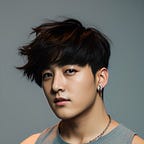Breaking Down the Emasculation of Asian Men in Western Media
How Positive Representation is Changing Harmful Stereotypes
For decades, Asian men have been emasculated in Western media, particularly in the United States. They have been portrayed as weak, effeminate, and lacking masculinity, perpetuating harmful stereotypes that have contributed to discrimination and racism against the Asian community.
This stereotype has been present in American media for over a century, with depictions of Asian men as villains, servants, and comic relief. From Mickey Rooney’s cringe-worthy portrayal of Mr. Yunioshi in “Breakfast at Tiffany’s” to the karate-chopping Kato in “The Green Hornet,” Asian men have been relegated to caricatures that serve to reinforce negative stereotypes about their masculinity.
But how did this stereotype come about, and what has been done to change it?
The emasculation of Asian men in Western media can be traced back to the late 1800s and early 1900s when Chinese immigrants first began arriving in the United States. At that time, the Chinese Exclusion Act was passed, which prohibited Chinese immigrants from entering the country, and those already in the United States were subject to discrimination and violence.
In response to this discrimination, Chinese immigrants began forming mutual aid societies, which provided assistance to new immigrants and helped to create a sense of community. However, these societies were often seen as a threat to the predominantly white society and were portrayed in the media as sinister and dangerous.
As a result, Asian men were often depicted as villains, particularly in movies and TV shows. They were seen as sneaky and cunning, with an insatiable desire for money and power. This stereotype was reinforced by the portrayal of Asian men as drug dealers, gang members, and human traffickers in Hollywood movies.
Even when Asian men were portrayed in a positive light, it was often as “sidekicks” or “wise old men” rather than as leading men. They were rarely shown as romantic interests, and if they were, it was often in a stereotypical manner that reinforced their emasculation.
One example of this is the 1984 movie “The Karate Kid,” where the Asian character, Mr. Miyagi, is portrayed as a wise old man who teaches the protagonist, Daniel, karate. Mr. Miyagi is never shown as a romantic interest or even as a sexual being, reinforcing the stereotype that Asian men are not masculine.
Another example is the TV show “Lost,” which ran from 2004 to 2010. The show had several Asian characters, but they were often relegated to minor roles and were not given significant storylines. One character, Jin, was initially portrayed as a controlling husband who physically abuses his wife. It wasn’t until later in the series that Jin’s character is given more depth and is shown in a more positive light.
However, despite these negative portrayals, things are changing. In recent years, there have been more positive representations of Asian men in Western media. For example, the TV show “Crazy Ex-Girlfriend” features a diverse cast that includes several Asian actors, including Vincent Rodriguez III, who plays the romantic lead. His character, Josh Chan, is shown as a complex and multi-dimensional character with strengths and weaknesses, rather than as a one-dimensional stereotype.
Another example is the movie “Crazy Rich Asians,” which was released in 2018. The movie features an all-Asian cast and was a box office success, grossing over $238 million worldwide. The movie is a romantic comedy that portrays Asian men as desirable and masculine, challenging the emasculation stereotype that has been perpetuated for so long.
Furthermore, the rise of social media and the internet has allowed Asian men to share their stories and experiences in a way that was not possible before. They can now showcase their talents and successes, challenge harmful stereotypes, and create their own media to represent themselves in a positive light.
One such example is the YouTube channel Wong Fu Productions, which was founded by three Asian-American men in 2003. The channel produces short films, web series, and music videos that feature Asian-American actors and tell stories that resonate with the Asian-American community. Wong Fu Productions has amassed a large following and has been instrumental in creating positive representations of Asian men in media.
Similarly, the rise of social media influencers has also allowed Asian men to showcase their masculinity and break down harmful stereotypes. For example, fitness influencer Kevin Kreider, who is of Korean descent, has built a following by showcasing his muscular physique and promoting fitness and healthy living. Kreider’s success challenges the stereotype of Asian men as weak and unathletic and promotes a more positive image of Asian masculinity.
Additionally, the growing political and social awareness of discrimination against Asians, particularly in light of the recent rise in hate crimes against Asians during the COVID-19 pandemic, has also contributed to a push for more positive representation of Asian men in Western media. There is a greater understanding of the harmful impact of stereotypes, and there is a growing demand for more diverse and inclusive media that accurately represents the diversity of the world we live in.
In conclusion, the emasculation of Asian men in Western media has been a harmful stereotype that has perpetuated discrimination and racism against the Asian community for over a century. However, in recent years, there has been a shift towards more positive representation of Asian men in media, challenging the harmful stereotypes that have been perpetuated for so long. The rise of social media, the internet, and social and political awareness have all played a role in creating more positive representations of Asian men in Western media, and there is hope that this trend will continue. By promoting diversity and inclusivity in media, we can break down harmful stereotypes and create a more just and equitable society.
